Comprehensive Guide to Garden Maintenance in Mill Hill
Introduction to Garden Maintenance

Maintaining a beautiful garden in Mill Hill requires dedication, knowledge, and the right techniques. Whether you're a seasoned gardener or just starting out, understanding the specifics of local climate, soil conditions, and plant varieties is essential for a thriving outdoor space.
Garden maintenance encompasses a variety of tasks that ensure your plants remain healthy and your garden looks its best throughout the year. From regular watering and pruning to seasonal planting and pest control, each aspect plays a crucial role in the overall health of your garden.
In Mill Hill, the unique blend of urban and suburban environments presents both opportunities and challenges for garden enthusiasts. This guide will walk you through the essential aspects of garden maintenance specific to Mill Hill, helping you create and sustain a picturesque garden that enhances your property's beauty.
Understanding the Mill Hill Climate
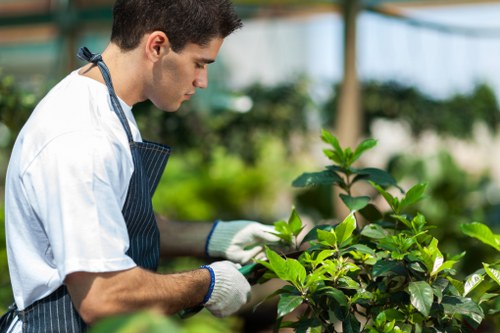
Mill Hill enjoys a temperate climate with mild winters and warm summers, making it suitable for a wide range of plant species. However, understanding the local weather patterns is key to effective garden maintenance.
**Temperature:** The average annual temperature in Mill Hill ranges from 5°C in winter to 25°C in summer. This variation requires selecting plants that can withstand temperature fluctuations.
**Rainfall:** With an average annual rainfall of about 600mm, ensuring proper drainage and watering schedules is vital to prevent waterlogging and drought stress.
Soil Preparation and Health

Healthy soil is the foundation of a successful garden. In Mill Hill, soil types can vary, but most residential areas have a mix of clay and loam soils.
Soil Testing: Before planting, conduct a soil test to determine pH levels and nutrient content. Mills Hill's soil typically has a neutral to slightly acidic pH, which is ideal for most garden plants.
Organic Matter: Incorporate compost or well-rotted manure to improve soil structure, fertility, and water retention. Regularly adding organic matter helps maintain soil health and supports robust plant growth.
Plant Selection and Landscaping
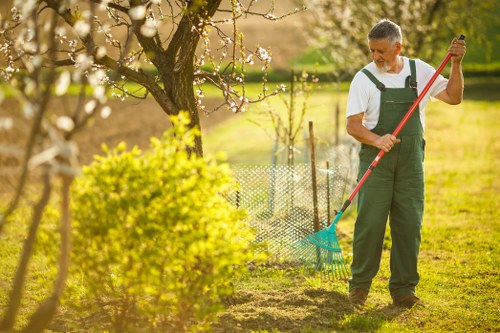
Choosing the right plants is crucial for minimizing maintenance and ensuring your garden flourishes in Mill Hill's climate.
Perennials vs. Annuals: Perennials provide long-term structure and require less replanting, while annuals offer vibrant seasonal color. A mix of both can create a dynamic and resilient garden.
Native Plants: Opting for native species reduces the need for intensive care and supports local biodiversity. Plants like lavender, foxgloves, and fox terriers thrive in Mill Hill's environment.
Regular Maintenance Tasks
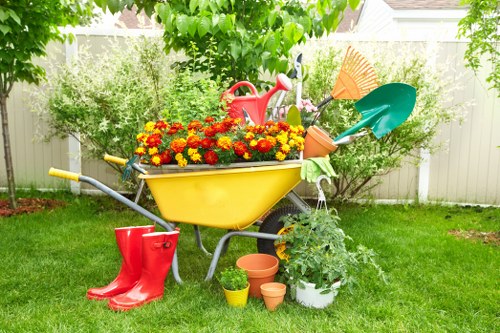
Consistent garden maintenance ensures your outdoor space remains attractive and healthy year-round. Here are key tasks to include in your maintenance routine:
- Watering: Adjust watering schedules based on seasonal changes. Early morning watering reduces evaporation and helps plants absorb moisture effectively.
- Weeding: Regularly remove weeds to prevent competition for nutrients. Mulching can help suppress weed growth.
- Pruning: Trim dead or overgrown branches to promote healthy growth and improve plant shape.
- Fertilizing: Provide essential nutrients through appropriate fertilizers to support plant development.
- Pest Control: Monitor for pests and diseases, using organic or chemical treatments as necessary to protect your plants.
Seasonal Gardening in Mill Hill
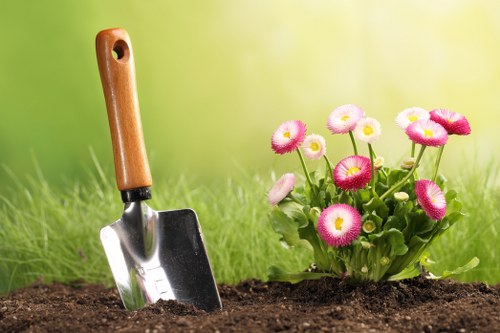
Adapting your garden maintenance practices to the changing seasons is vital for sustained garden health.
Spring Maintenance
Spring is the perfect time to prepare your garden for the growing season. Tasks include:
- Clearing debris and dead plants from winter.
- Pruning shrubs and trees.
- Planting new flowers, vegetables, and herbs.
Summer Care
During the summer months, focus on:
- Regular watering and mulching to retain moisture.
- Controlling pests and diseases.
- Deadheading spent flowers to encourage new blooms.
Autumn Preparations
As temperatures drop, prepare your garden by:
- Planting autumn color foliage.
- Harvesting remaining vegetables.
- Applying compost and mulch to protect plants over winter.
Winter Care
In winter, maintenance focuses on:
- Protecting sensitive plants from frost.
- Planning and designing for the next gardening season.
- Cleaning and storing garden tools.
Tools and Equipment for Garden Maintenance
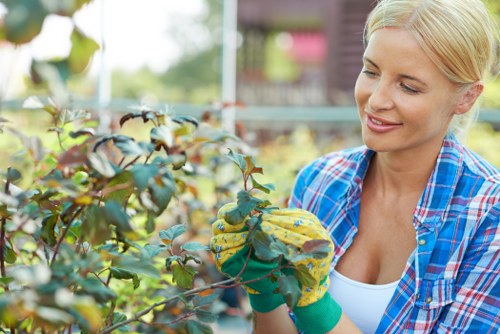
Having the right tools makes garden maintenance more efficient and enjoyable. Essential tools include:
- Pruners and Shears: For trimming and shaping plants.
- Garden Fork and Shovel: For soil preparation and planting.
- Watering System: Efficient irrigation systems ensure consistent watering.
- Weeding Tools: To effectively remove unwanted plants.
- Gloves and Protective Gear: To protect yourself while working in the garden.
Investing in high-quality, durable tools can save time and effort in the long run, making garden maintenance a less daunting task.
Hiring Professional Garden Maintenance Services
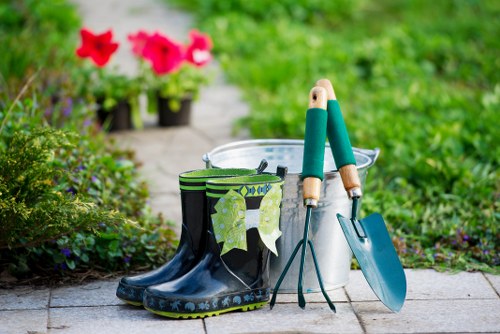
While DIY garden maintenance is rewarding, there are times when professional help can make a significant difference. Professional gardeners in Mill Hill offer expertise and services that ensure your garden remains in top condition.
**Benefits of Hiring Professionals:**
- Expert knowledge of local plant species and climate.
- Time-saving, allowing you to enjoy your garden without the stress of maintenance.
- Access to specialized tools and equipment.
- Customized maintenance plans tailored to your garden's needs.
If you're overwhelmed by garden tasks or seeking to enhance your garden's design and health, professional services can be a valuable investment.
Sustainable Gardening Practices

Adopting sustainable gardening practices not only benefits the environment but also contributes to a healthier and more resilient garden. Here are some eco-friendly strategies:
- Composting: Recycling garden waste into compost enriches the soil and reduces landfill waste.
- Rainwater Harvesting: Collecting rainwater conserves water and provides natural irrigation for plants.
- Native Planting: Native species require less water and are more resistant to local pests and diseases.
- Organic Pest Control: Using natural methods to manage pests minimizes chemical usage and protects beneficial insects.
Implementing these practices ensures your garden remains vibrant and sustainable for years to come.
Enhancing Garden Aesthetics

A well-maintained garden is not just about plant health; it's also about creating a visually pleasing environment. Consider the following tips to enhance your garden's aesthetics:
Garden Design and Layout
Plan your garden layout to create a harmonious balance between different plant types, colors, and textures. Incorporate pathways, borders, and focal points to guide the eye and add structure.
Lighting
Proper lighting can transform your garden in the evening, highlighting key features and extending the usability of your outdoor space.
Decorative Elements
Adding garden ornaments, benches, and water features can enhance the overall appeal and provide areas for relaxation and enjoyment.
Common Garden Challenges in Mill Hill
[IMG_11]Garden maintenance in Mill Hill comes with its set of challenges. Being aware of these issues and knowing how to address them is crucial for a thriving garden.
Pest Management
Pests like aphids, slugs, and caterpillars can damage plants. Implement integrated pest management (IPM) strategies, combining biological, chemical, and cultural practices to control pest populations.
Disease Control
Fungal diseases and bacterial infections can spread quickly in humid conditions. Ensure proper air circulation, avoid overhead watering, and promptly remove affected plants to prevent the spread.
Weed Invasion
Weeds compete with garden plants for nutrients and water. Regular weeding, mulching, and using landscape fabric can help keep weeds at bay.
Optimizing Garden Maintenance for SEO
[IMG_12]To ensure your garden maintenance practices align with search engine optimization (SEO) strategies, consider the following tips:
- Keyword Integration: Use keywords like "Garden Maintenance in Mill Hill", "Mill Hill Gardening Services", and related terms naturally throughout your content.
- Quality Content: Provide valuable, informative, and well-structured content that addresses common gardening questions and concerns.
- Mobile Optimization: Ensure your content is accessible and readable on all devices, enhancing user experience.
- Internal Linking: Link to other relevant sections of your website to keep users engaged and improve site navigation.
- Local SEO: Incorporate local keywords and information specific to Mill Hill to attract a targeted audience.
Conclusion
[IMG_13]Effective garden maintenance in Mill Hill involves a combination of understanding the local climate, preparing healthy soil, selecting suitable plants, and performing regular upkeep tasks. By implementing sustainable practices and addressing common challenges, you can create a beautiful and resilient garden that enhances your property's appeal.
Whether you choose to maintain your garden yourself or hire professional services, the key is consistency and attentiveness to your garden's needs. Start today and enjoy the rewards of a well-maintained garden in Mill Hill.
Contact us today to learn more about our garden maintenance services and transform your outdoor space into a flourishing haven.
